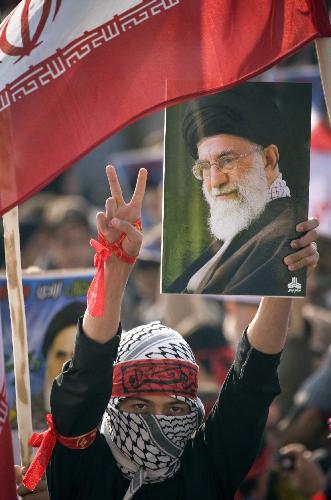Iran hails new nuclear achievement on revolution anniversary
Iran's President Mahmoud Ahamdinejad announced his country's new achievement in its nuclear program on Thursday as Iranians rallied to mark the 31st anniversary of Islamic Revolution which ended the pro-American shah regime in 1979.
 |
|
Iranian President Mahmoud Ahmadinejad takes part in the demonstration to mark the 31st anniversary of the Islamic Revolution in Tehran February 11, 2010. [Xinhua/Reuters Photo] |
Millions of Iranians nationwide took to the streets with flags and banners in support of the Islamic regime, and images of the late Supreme Leader Ayatollah Ruhollah Khomeini and incumbent leader Ayatollah Ali Khamenei.
Chanting anti-U.S. and anti-Israel slogans, the crowd swarmed the Azadi (freedom) Square and nearby areas in Tehran to express their loyalty to the Islamic Revolution's ideals.
Addressing the rally, Iranian President Mahmoud Ahmadinejad enumerated a number of the Iranian government's achievements and enthusiastically denounced the West's policies.
Ahmadinejad announced the production of the first batch of high grade uranium, saying that "the first batch of 20 percent (enriched uranium) fuel was produced."
On Tuesday, Iran announced it began enriching uranium to a level of 20 percent at its Natanz enrichment facility under the surveillance of inspectors from the International Atomic Energy Agency (IAEA).
 |
|
Women listen as Iranian President Mahmoud Ahmadinejad speaks during a ceremony to mark the 31st anniversary of the Islamic Revolution in Tehran February 11, 2010. [Xinhua/Reuters Photo] |
"This work (of enrichment) will be continued until the needs of the country are met," he said, adding that "in the future the daily production will be tripled."
Ahmadinejad hailed the country's access to high-grade enrichment know-how and pointed out that "right now in Natanz, we have the capability to enrich 20 percent and 80 percent (uranium), but since we don't need it, we don't enrich (to the higher grade)."
The Iranian president rejected the western propaganda that its nuclear program may end in building the atom bombs.
"All of our (nuclear) activities are transparent and under the supervision of the IAEA," he said, adding "we don't build bombs ... if our nation wants to build bombs, it has the courage to announce it openly and make it with no fear."
On Iran-U.S. relations, Ahmadinejad said that U.S. President Barack Obama is "missing chances" to make changes and do reforms.
 |
|
An Iranian youth holds an image of Iran's Supreme Leader Ayatollah Ali Khamenei during a ceremony to mark the 31st anniversary of the Islamic Revolution in Tehran February 11, 2010. [Xinhua/Reuters Photo] |
"We expected Mr. Obama to be able to make changes and we announced that we will help him," he said, adding "unfortunately, the hope to reform is turning to disappointment quickly."
"We want him to compensate for the inhumane acts of (former U.S. President George W.) Bush and to mend them ... He (Obama) moves in the way that is against his interests and against the interests of the Americans, (but) in line with the interests of Zionists," Ahamdinejad said.
China said Thursday it hoped negotiations on Iran nuclear issue would be resumed at an early date and that it would continue its efforts for this end.
"Dialogues and negotiations are the best ways to resolve this issue," said Ma Zhaoxu, spokesman for the Foreign Ministry, at a regular press conference.
On Wednesday, Russian Deputy Foreign Minister Sergei Ryabkov said sanctions against Iran have become more "relevant" following Tehran's decision to enrich uranium to higher levels.
The Western countries are trying to press Russia to support extra sanctions against Iran, but Russia still believes that sanctions are not a solution to the problem, Ryabkov said.
The U.S. Treasury Department slapped further sanctions against Iranian Revolutionary Guard Corps (IRGC) on Wednesday, freezing assets of an individual and four companies affiliated with the IRGC.
U.S. President Barack Obama said on Tuesday that his administration will develop "a significant regime of sanctions" over the next several weeks targeting Iran, as Tehran declared it had started the process of producing 20-percent enriched uranium inside the country.
Iran has been at the center of an international dispute over its nuclear plan. The United States and its Western allies have been accusing Iran of secretly developing nuclear weapons under the disguise of a civilian program.
Iran has denied the accusation and stressed its nuclear program is only for peaceful purposes.
 0
0 






